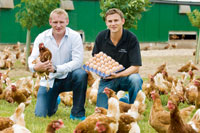2010 FW Awards: Poultry Farmer of the Year finalists – Adrian and James Potter

Regional branding, but on a national scale, is the business ethos for Adrian and James Potter who, with their parents Roger and Sue, run Yorkshire Farmhouse Eggs from Thirsk in North Yorkshire.
Having started with just 80 hens and a shed in 1979, the family has watched the business expand exponentially to the point where it now produces eggs from 162,000 of its own free-range birds and takes eggs from another 290,000 birds on contract.
These are all located within a 30-mile radius of the company’s three pack houses – in North Yorkshire, East Sussex and Bedfordshire.
“We pay our contracted suppliers some of the best prices in the country,” says Adrian. “We are able to achieve this only by having strong brands; that means emphasising the regional aspects of production.”
The company claims two of the country’s largest independent brands in the form of James Potter eggs in the north and Hoads Farm eggs in the south. The two brands generate a turnover of approximately £10m, and can be found in almost 700 superstores across the country. “We used to have more than half our business with one supermarket, but now we aim to have at least 60% in our branded product as this gives us greater control and allows us to add the most value,” says Adrian.
But like any brand, James Potter and Hoads Farm eggs have only become successful as a result of a combination of creative thinking and hard work. For example, when Yorkshire Farmhouse Eggs bought Hoads Farm near Hastings in East Sussex in 2005 the business was underperforming.
“Our initial step was to revamp the packaging by giving it a more personal feel that better depicts our company values,” says Adrian. “We then visited the supermarkets – some of which had delisted Hoads Farm – to get our product back on the shelves.”
It’s a five-hour drive from North Yorkshire to East Sussex, but it’s a journey the Potters made many times as they went from one supermarket to the next, insisting on meetings with store managers and buyers to persuade them to take the brand. Since then, sales have risen four-fold and the Potters now supply Hoads Farm eggs to more than 450 stores in the south-east, including regular van deliveries to London.
But as well as getting the marketing right, the Potters have also focussed on production and that means a move into multi-tier. The first of five planned units has been completed at the home farm near Thirsk, at a cost of about £800,000, and is now housing its first flock of 32,000 ISA Warrens. A further four multi-tier units are planned over the next two years as the Potters phase out their old flat bed units.
“We first thought about multi-tier a couple of years ago, so I went to Holland to find out more,” recalls James. “I was impressed by both the efficiency and the welfare benefits and we decided this was the way to go.”
James estimates that the additional cost of multi-tier stands at about £4 a bird, but extra revenue of £4 a bird from more eggs laid and the reduced number of seconds, compensates. Total egg production is projected at 320 per bird.
“Going forward, I think that people will increasingly opt for the new multi-tier system. People may use the flat bed system to create a differentiated market to get a premium, but I doubt it will work,” he predicts.
Yorkshire Farmhouse Eggs is investing about £5m in new poultry housing and upgraded packing facilities over the next two years. But it’s an investment that should pay off, with the company having recently won an £8m contract to supply a leading retailer.
Expansion is also planned for Wood Farm, Bedfordshire – a recent joint venture with the Mears family in East Anglia. The business is based around a 32,000-bird flock at the company’s Freedom Foods demonstration farm at Waresley – where the hens share paddocks with thoroughbred racehorses.
With another four contracted free-range egg producers, the business supplies about 100 Sainsbury’s stores in the area. Whether it is Yorkshire, Sussex or Bedfordshire, the development of the Yorkshire Farmhouse Egg business is dependent on a strong partnership with contracted suppliers. “We work hard at this,” says Adrian.
As well as paying an above-average price, the Potters are also introducing a 2p/dozen bonus scheme to encourage contractors to plant trees. “This has clear environmental benefits, but it also encourages the birds to range and that helps with the consumer image.”
With the free-range egg market facing challenging times, getting the image right has never been more important.
The judges liked
• Commitment to regional branding
• Good environmental record
• Clear strategy for the future
Farm facts
• 162,000 free-range layers in North Yorkshire
• 100,000 home-reared pullets
• 22 contracted free-range suppliers
• Three pack houses
• 40 employees
• Turnover of £15m
• For more on the 2010 Farmers Weekly Awards
• For more on the 2010 finalists
